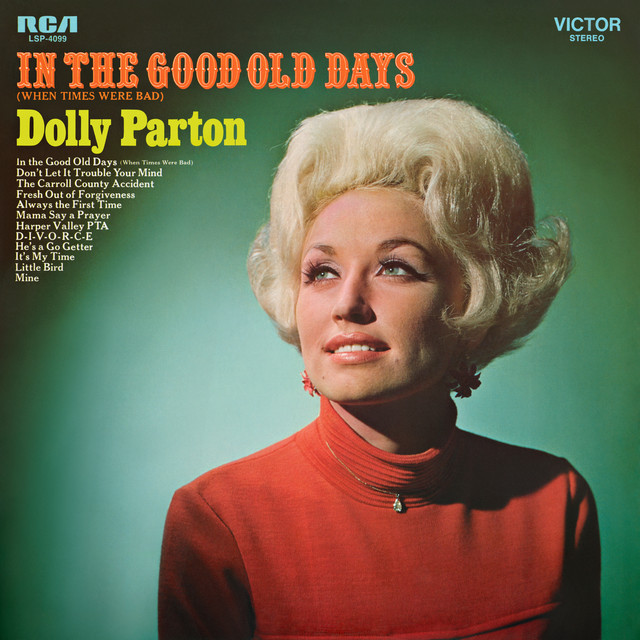DOLLY YOUR ENTHUSIASM (18)
By:
February 23, 2023
One in a series of 25 enthusiastic posts, contributed by 25 HILOBROW friends and regulars, on the topic of favorite Country singles from the Sixties (1964–1973). Series edited by Josh Glenn. BONUS: Check out the DOLLY YOUR ENTHUSIASM playlist on Spotify.

DOLLY PARTON | IN THE GOOD OLD DAYS (WHEN TIMES WERE BAD) | 1968
One of the worst parts of loving country music is being obliged to answer for its sins. Most of the conservatism so thoroughly etched into the genre’s industry, at least, comes back to racism — more elemental than any aesthetic cue to the initial “hillbilly music” sales pitch, which defined those 78s by what they were not. They were not “race music,” and they were not cosmopolitan or aspirational, like much of the other pop music marketed to white people at the time. Instead of aiming for slickness or hipness, “hillbilly music” found its niche in nostalgia — the right-wing ideology through rose-colored (or dirt-road-hued) glasses that persists in many of the genre’s most commercially successful songs today.
A fixation on authenticity goes hand in hand with that love of nostalgia, and few could claim more authentic backwoods bonafides than the Backwoods Barbie herself, Dolly Parton. Born in a one-room cabin in the Smoky Mountains, Parton grew up in relentless poverty, which she describes in detail on “In The Good Old Days (When Times Were Bad).” The song is both undeniably country and deeply honest, a perfect rebuke to all the backwards-looking country songs that would tell Parton she’s better off for having to pull herself up by her proverbial bootstraps.
Hunger, medical ailments that she and her family couldn’t afford to treat, endless work, shelter that couldn’t protect them from the elements, extreme weather reducing their farm to nothing — all get their due in the song, without the redemptive affection heard in Parton’s “Coat Of Many Colors” and “My Tennessee Mountain Home.” The singer has long been as prone to self-mythologizing and rural reverence as the next Nashville icon (see: Dollywood), but “In the Good Old Days” shows that for all that fantasy, Parton still centers a core truth. “No amount of money could buy from me the memories that I have of then,” she acknowledges in the song’s hook, before hammering home its main point. “No amount of money,” she sings, “could pay me to go back and live through it again.”
It is astonishing that this thoughtful but simple observation is so rarely echoed by Parton’s descendants on country radio. (Her contemporaries respected it: Merle Haggard recorded the song for Mama Tried a few months before it was released by Parton as a single.) That you can love your family and appreciate your upbringing while acknowledging that you don’t think other people should have to go through the same hardships; that there are downsides as well as blessings to life in a small town, or on a farm, or as a blue-collar worker. On a commercial country record that peaked at No. 25 on Billboard’s country charts, Parton matter-of-factly deflated one of the genre’s central myths — may any of the contemporary artists who purport to revere her be a fraction as brave.
DOLLY YOUR ENTHUSIASM: INTRODUCTION by Josh Glenn | David Cantwell on Porter Wagoner and Dolly Parton’s WE FOUND IT | Lucy Sante on Johnny & June Carter Cash’s JACKSON | Mimi Lipson on George Jones’s WALK THROUGH THIS WORLD WITH ME | Steacy Easton on Olivia Newton-John’s LET ME BE THERE | Annie Zaleski on Tammy Wynette’s D-I-V-O-R-C-E | Carl Wilson on Tom T. Hall’s THAT’S HOW I GOT TO MEMPHIS | Josh Glenn on Commander Cody and His Lost Planet Airmen’s BACK TO TENNESSEE | Elizabeth Nelson on Skeeter Davis’s I DIDN’T CRY TODAY | Carlo Rotella on Buck Owens’ TOGETHER AGAIN | Lynn Peril on Roger Miller’s THE MOON IS HIGH | Erik Davis on Kris Kristofferson’s SUNDAY MORNIN’ COMIN’ DOWN | Francesca Royster on Linda Martell’s BAD CASE OF THE BLUES | Amanda Martinez on Bobbie Gentry’s FANCY | Erin Osmon on John Prine’s PARADISE | Douglas Wolk on The Byrds’ DRUG STORE TRUCK DRIVIN’ MAN | David Warner on Willie Nelson’s WHISKEY RIVER | Will Groff on Tanya Tucker’s DELTA DAWN | Natalie Weiner on Dolly Parton’s IN THE GOOD OLD DAYS (WHEN TIMES WERE BAD) | Charlie Mitchell on Stonewall Jackson’s I WASHED MY HANDS IN MUDDY WATER | Nadine Hubbs on Dolly Parton’s COAT OF MANY COLORS | Jada Watson on Loretta Lynn’s DON’T COME HOME A DRINKIN’ (WITH LOVIN’ ON YOUR MIND) | Adam McGovern on Johnny Cash’s THE MAN IN BLACK | Stephen Thomas Erlewine on Dick Curless’s A TOMBSTONE EVERY MILE | Alan Scherstuhl on Waylon Jennings’s GOOD HEARTED WOMAN | Alex Brook Lynn on Bobby Bare’s THE WINNER. PLUS: Peter Doyle on Jerry Reed’s GUITAR MAN | Brian Berger on Charley Pride’s IS ANYBODY GOING TO SAN ANTONE.
JACK KIRBY PANELS | CAPTAIN KIRK SCENES | OLD-SCHOOL HIP HOP | TYPEFACES | NEW WAVE | SQUADS | PUNK | NEO-NOIR MOVIES | COMICS | SCI-FI MOVIES | SIDEKICKS | CARTOONS | TV DEATHS | COUNTRY | PROTO-PUNK | METAL | & more enthusiasms!
